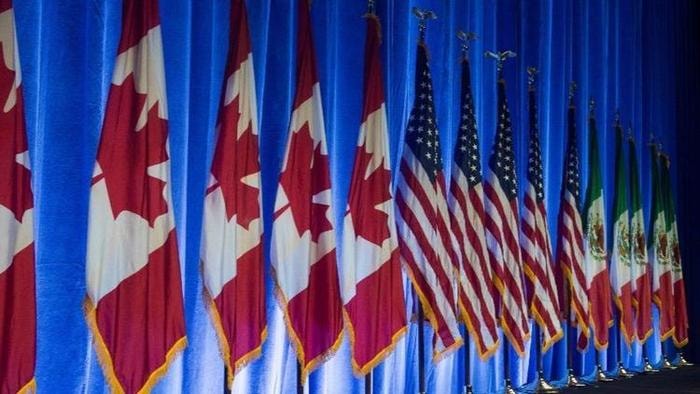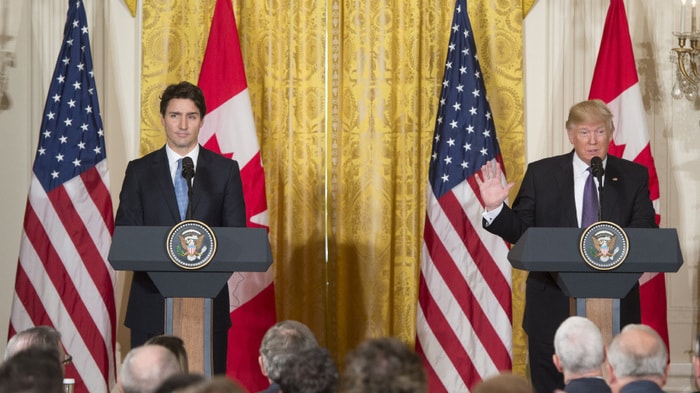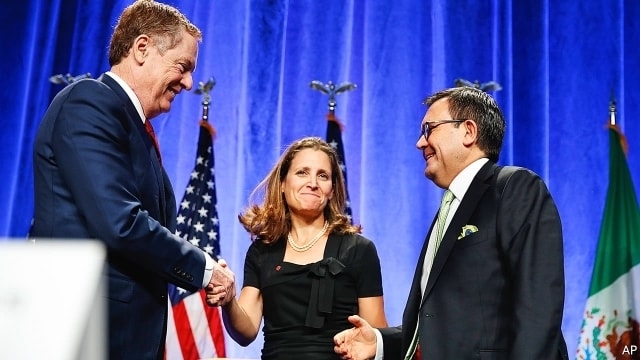NAFTA 2.0 will have to balance interests
(Baonghean.vn) - The three North American neighbors, the United States, Mexico and Canada, are holding a second round of negotiations to review the terms of the North American Free Trade Agreement (NAFTA). However, the success of the negotiations is more influenced by political factors than the reality on the table.
Urgent itinerary
"NAFTA 2.0" is being hastily negotiated for possible revision by the end of this year, or at least early 2018, to avoid political complications that may arise from the presidential election in Mexico as well as the US midterm elections next year. This is considered an ambitious plan for negotiating a regional agreement.
 |
| The renegotiation of the North American Free Trade Agreement (NAFTA) will re-examine the relationship between three neighboring countries: the US, Canada and Mexico (The Economist). |
There is still much work to be done in the last four months of the year as the three countries have not found common ground in their stances and tough goals. Now is the time to seek compromises on interests. For the US, 'remaking' NAFTA seems to be the number one trade policy priority this year. US President Donald Trump has high expectations for the NAFTA renegotiations.
It is considered a "test" to evaluate the commitments and policies that Mr. Trump pursued before taking office, including reshaping trade relations with countries in a protectionist direction, increasing trade barriers to realize the goal of "America First".
 |
| NAFTA becomes the target of criticism from US President Donald Trump (MacLean.ca). |
On the other hand, the outcome of the NAFTA negotiations is also in the core interests of the two neighboring countries of the United States. NAFTA 2.0 will have to continue to protect the economies and job markets of Canada and Mexico. At the same time, it will determine the position of these two countries in front of their giant partner and important neighbor, the United States.
In terms of politics and strategy, the NAFTA renegotiation is also considered a "measure" of the nature of the relationship between the three neighboring North American countries, which was still considered quite "smooth sailing" under the previous administrations of President Trump.
Who wins, who loses
Just before this second session, the two neighboring countries of the US suddenly panicked over President Donald Trump's threat on August 28 that the US would soon start the process of withdrawing from NAFTA, while emphasizing that Mexico would have to pay for the construction of a wall on US territory along the border with Mexico.
According to Mr. Trump, Mexico is currently having difficulty in negotiations to revise NAFTA - one of the "worst" trade agreements signed to date. According to him, the process of dismantling this agreement must be started before a fair agreement can be reached.
This is not the first time Mr. Trump has mentioned withdrawing from NAFTA, but this time it is no different from a real threat if the two neighboring countries do not 'give in' to the US's demands. Mexico also did not take long to 'fight back'. Foreign Minister Luis Videgaray announced that he would leave the negotiating table if US President Donald Trump activated the clause to withdraw from NAFTA.
But the US withdrawal from NAFTA certainly does not depend only on President Trump's will. Mr. Trump will have to consult Congress if he wants to take the US out of this trilateral agreement. This is clearly not easy for a Congress that has not cooperated with the White House since the beginning of his term until now.
 |
| Representatives of the three countries at the negotiating table (San Diego Union Tribune) |
Not to mention that withdrawing from NAFTA will cause significant damage to the US economy. According to the assessment of credit rating agency Fitch Ratings, in case the renegotiation of the North American Free Trade Agreement (NAFTA) fails, Mexico will not be the only country affected, but the remaining two countries, Canada and the US, including 15 US states, will suffer heavy losses.
Fitch believes that in trade relations with Mexico, US states such as New Mexico, Texas or Arizona will suffer the greatest losses because exports to Mexico account for a large proportion of 43%, 40% and 38% of the total export turnover of these states, respectively.
Meanwhile, South Dakota, Nebraska, Iowa, Kansas and Missouri all have export ratios to Mexico ranging from 15-25%. In addition, 11 US states, including Maine, Montana, Michigan, Vermont, Ohio, Missouri, South Dakota, North Dakota and Indiana, are heavily dependent on trade relations with Canada, with more than 30% of their exports going to this market.
For Mexico, it needs to consider its position to get a reasonable outcome. In fact, NAFTA, which came into effect in 1994, has made Mexico increasingly dependent on the US for food supplies and high prices for consumers. Mexico now imports up to 45% of its food needs. This has put Mexico in a position of supply dependence, especially on imports from the US, which supplies up to 50% of total imports.
If this trend continues, 80% of Mexico’s food imports will come from the United States by 2030. The main food items Mexico imports from the United States include corn, pork, wheat, powdered milk, and chicken. Because of subsidies, U.S. food exports to Mexico cost less than the cost of domestic production, which is unfair trade. And the renegotiation of NAFTA will continue to threaten rural Mexico because the agreement will benefit multinational corporations more than small and medium-sized producers in Mexico.
This reality shows that the nature of NAFTA after 23 years of existence is the excessive economic dependence of these three North American partners. No one benefits completely, and no one 'loses everything'. Any solution for NAFTA 2.0 must be considered based on mutual benefits. Therefore, the agreement cannot be achieved with populist political pressure./.
Thanh Son
| RELATED NEWS |
|---|
